|
|
|
Sort Order |
|
|
|
Items / Page
|
|
|
|
|
|
|
| Srl | Item |
| 1 |
ID:
124070


|
|
|
|
|
| Publication |
2013.
|
| Summary/Abstract |
Different countries have varying definitions of the word "veteran," which in turn influence the benefits that ex-Service personnel receive. However, public opinion does not necessarily reflect official definitions. This article seeks to identify whether characteristics by which UK ex-Service personnel self-identify as veterans are aligned with official policy/public opinion, and which factors are associated with self-identification as a veteran. This article utilizes data from a structured telephone interview survey of UK Armed Forces personnel. All those who had left the military by the time of interview (n = 202) were asked whether they considered themselves to be a veteran. Their responses were recorded and analyzed. Only half of the sample considered themselves to be veterans. Definitions used by UK ex-Service personnel do not align with the official UK government definition or public perceptions of "veterans," which tend to focus on older veterans and/or those who served in both World Wars.
|
|
|
|
|
|
|
|
|
|
|
|
|
|
|
|
| 2 |
ID:
124060
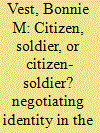

|
|
|
|
|
| Publication |
2013.
|
| Summary/Abstract |
This study examines the construction of US Army National Guard members' dual identities as soldiers and civilians and posits processes, including behavioral practice, spatial displacement, and narrativity, which soldiers use to reconcile these potentially contradictory identities to develop an understanding of themselves as "citizen-soldiers." Ethnographic evidence gathered from in-depth interviews suggests that for National Guard members who have never experienced deployment, the two identities of civilian and soldier are mostly separated. However, after experiencing deployment and reintegration, soldier and civilian identities become more intertwined and individuals must reorganize their identity according to different conceptions; integrating on a more permanent basis two different cultural modes of being. In light of the National Guard's increased participation in deployments post-9/11, this reorganization of identity is contributing to a shift in the meaning of "citizen-soldiery" in the current US context.
|
|
|
|
|
|
|
|
|
|
|
|
|
|
|
|
| 3 |
ID:
124063
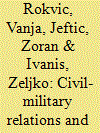

|
|
|
|
|
| Publication |
2013.
|
| Summary/Abstract |
This article focuses on the democratization of civil-military relations and the implementation of democratic control of the armed forces in the Republic of Serbia. By analyzing the basic parameters of democratic civil-military relations, we attempt to evaluate whether civil-military relations in the Republic of Serbia can be classified into a type of relations that occur in consolidated democracies. Based on an examination of legal documents and other data, this article concludes that democratic changes since October 2000 have greatly influenced the course of relations between military and political elites and that civil-military relation in Serbia meet most of the defined parameters. However, due to the difficulties in the implementation of this control in practice, civil-military relations in Serbia can only partially be classified as a type of relations that occur in consolidated democracies.
|
|
|
|
|
|
|
|
|
|
|
|
|
|
|
|
| 4 |
ID:
124062


|
|
|
|
|
| Publication |
2013.
|
| Summary/Abstract |
This study aims to analyze the effects of democratic transition on alliance commitment, focusing on political leaders' types and civil-military relations. This work expects to find that democratizers are more likely to be faithful to their existing alliance partner when their political leaders are old elites who are reluctant to initiate drastic domestic reforms and when their political leaders try to reduce military's influence on domestic affairs. By tracing the process of three US allies' participation (or nonparticipation) in the US-led multinational coalition against Iraq during the Persian Gulf War period, this study explores whether and how the domestic conditions affect alliance policies. The case studies on South Korea, Turkey, and the Philippines provide some support for the nexus approach which links domestic circumstances to foreign conditions.
|
|
|
|
|
|
|
|
|
|
|
|
|
|
|
|
| 5 |
ID:
124066


|
|
|
|
|
| Publication |
2013.
|
| Summary/Abstract |
This article addresses an underreported aspect of contemporary warring in the Democratic Republic of Congo (DRC): the experiences of women soldiers and officers in the Congolese national armed forces (Forces Armées de la République Démocratique du Congo [FARDC]). It thus addresses an empirical gap in scholarly and policy knowledge about female soldiers in national armies on the African continent, and the DRC in particular. Based on original interviews, the article explores the way female soldiers in the FARDC understand their identities as "women soldiers" and offers new insight into women soldiers' role and responsibilities in the widespread violence committed against civilians in the DRC. Moreover, it explores how their understanding of themselves as "women soldiers" both challenges and confirms familiar notions of the army as a masculine sphere. Such insight is important for better understanding the gendered makeup of the military and for contributing to a knowledge base for Security Sector Reform in this violent (post)conflict setting.
|
|
|
|
|
|
|
|
|
|
|
|
|
|
|
|
| 6 |
ID:
124065
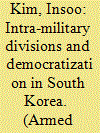

|
|
|
|
|
| Publication |
2013.
|
| Summary/Abstract |
This paper investigates how a highly politicized system of military reshuffling under the authoritarian military regime contributed to the transition to democracy in South Korea in the 1980s. Through an analysis of individual data on 2,666 Korean Military Academy (KMA) graduates, this study shows that promotion policies favored a small group of KMA graduates, called the Hana faction, who were preferentially treated in military promotions and recruited into the military leadership. These biased promotion procedures undermined the cohesion within the military as the marginalized non-Hana faction graduates became increasingly resistant to the subordination of their Hana faction superiors. This disintegration of military cohesion ultimately reduced the regime's capacity to block the transition to democracy.
|
|
|
|
|
|
|
|
|
|
|
|
|
|
|
|
| 7 |
ID:
124067


|
|
|
|
|
| Publication |
2013.
|
| Summary/Abstract |
In this research note, the rapid decline of the veteran population in the United States from 1980 to 2010 is outlined. The decline in the veteran population has been accompanied by an increasing concentration of veterans in smaller, more rural counties, often surrounding military bases. The result is that there has been a consistent increase in the residential segregation of veterans from the nonveteran population.
|
|
|
|
|
|
|
|
|
|
|
|
|
|
|
|
| 8 |
ID:
124061
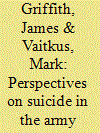

|
|
|
|
|
| Publication |
2013.
|
| Summary/Abstract |
Suicides in the US military were observed rising in 2004, most notably in the Army and Marine Corps, and particularly, in the Army National Guard (ARNG). Alarmed, Army leaders and researchers have offered various explanations and prescriptions, often lacking any evidence. In the present study, three data sets were used to examine evidence for various perspectives on suicide-dispositional risk, social cognitive, stressor-strain, and social cultural/institutional, each having different emphases on relevant explanatory variables and underlying mechanisms of suicide. Primary risk factors associated with having committed suicide among the 2007-2010 ARNG suicide cases were age (young), gender (male), and race (white), supporting the dispositional risk perspective on suicide. Some evidence supported the stressor-strain perspective in that postdeployment loss of a significant other and a major life change showed statistically significant, yet weaker associations with increased suicide intentions. Implications of results are discussed for future research and preventive strategies.
|
|
|
|
|
|
|
|
|
|
|
|
|
|
|
|
| 9 |
ID:
124059
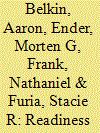

|
|
|
|
|
| Publication |
2013.
|
| Summary/Abstract |
Prior to the repeal of "don't ask, don't tell" (DADT) on September 20, 2011, many observers predicted that allowing lesbian, gay and bisexual troops to serve openly would harm the military, and a group of more than 1,000 retired general and flag officers predicted that repeal could "break the All-Volunteer Force." This study is the first scholarly effort to assess the accuracy of such predictions about the impact of DADT repeal on military readiness. We conducted our research during the half-year period starting six months after repeal and concluding at the one year mark, and we pursued ten separate research strategies including in-depth interviews, survey analysis, on-site field observations, pretest/posttest quasi experimentation, secondary source analysis, and a comprehensive review of media articles. Our goal was to maximize the likelihood of identifying evidence of damage caused by repeal, and we made vigorous efforts to collect data from repeal opponents including anti-repeal generals and admirals, activists, academic experts, service members and watchdog organizations. Our conclusion, based on all of the evidence available to us, is that DADT repeal has had no overall negative impact on military readiness or its component dimensions, including cohesion, recruitment, retention, assaults, harassment, or morale. If anything, DADT repeal appears to have enhanced the military's ability to pursue its mission.
|
|
|
|
|
|
|
|
|
|
|
|
|
|
|
|
|
|
|
|
|